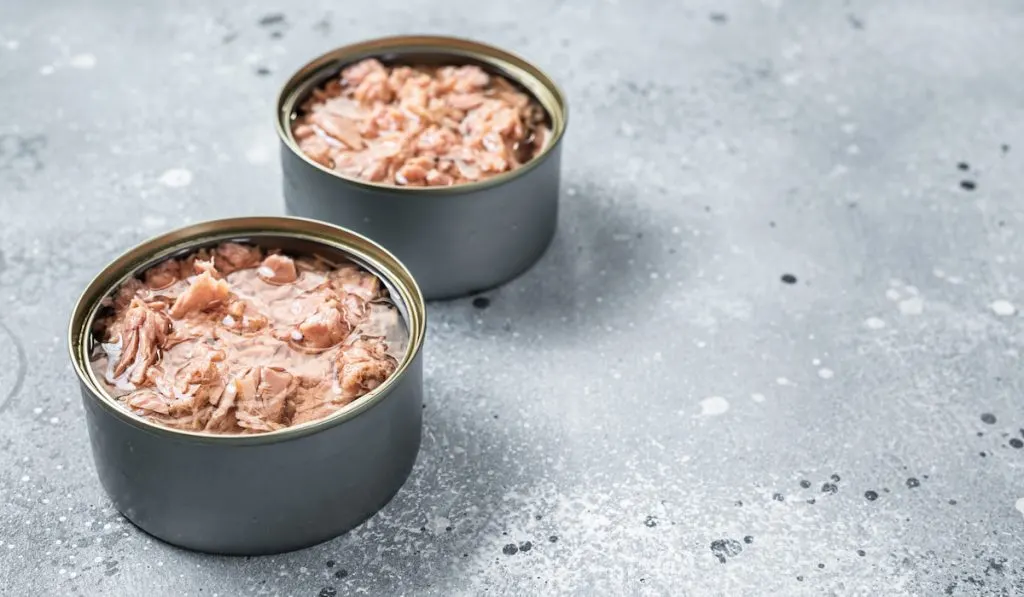Protein is a non-negotiable part of a hedgehog’s diet. So, since tuna is an immense source of protein, you may be considering feeding it to your hedgie. But is it really safe? Let us find out.
Can hedgehogs eat tuna?
Hedgehogs can eat tuna.
In some quarters, the advice is that hedgehogs should not eat fish because it is not a part of their regular diet in the wild. But this recommendation does not appear to define the safety of fish in hedgehogs.
In other words, under normal conditions, tuna is safe for hedgehogs. However, it may make their poop smellier.

There is more to know about feeding tuna to hedgehogs, and in the rest of this post, we discuss those details.
Can Hedgehogs Eat Tuna?
Some people do not recommend giving tuna or any other fish to hedgehogs.
However, besides possibly making their poop smelly, there seems to be no problem with letting hedgies eat tuna.
For hedgehogs, the protein-fat ratio in their meal is essential. Their diet should have high levels of protein and low levels of fat.
Tuna offers just that; it is estimated to contain 28% protein and around 2% fat.
Now, you may find out that your hedgehog does not like tuna. This is not a general trend.
Amongst hedgehogs, some may like tuna, and some may stay away from eating it. It is all up to the individual hedgehogs.
When feeding tuna to hedgehogs, ensure you cook the tuna. Do not give your hedgehog raw tuna, else you risk giving it a foodborne illness.
Also, while cooking the tuna, do not add salt, oil, seasoning, or any other ingredient.
These ingredients affect the digestive system of a hedgehog negatively. They may also affect some other internal organs like the heart and kidney.
For safety, get the bones in the tuna out before offering it to your hedgehog. Leaving the bones in leaves the hedgehogs at risk of choking.
You should also cut the tuna into smaller pieces to further reduce the risk of choking.

Can Hedgehogs Digest Tuna?
Remember we mentioned that a hedgehog’s poop might become smelly from eating fish? Well, at one point, people thought the odor was because hedgies could not digest fish.
However, it has been shown that this smell comes from eating large amounts of fish at once.
So, can hedgehogs digest tuna? Yes, hedgehogs can digest tuna.
Tuna is composed of protein, fat, and other biomolecules hedgehogs require and digest in their regular meals.
Nutrition Facts
You may be wondering; what nutrients does tuna offer to hedgehogs? Well, we discuss some of them below:
Protein
Tuna has a protein content of about 26-28%. Seeing that hedgehogs need around 20-50% protein in their meal, the protein in tuna is sufficient.
Protein is broken down into amino acids in the body of a hedgehog. Amino acids, in turn, are the building blocks of various structures in a hedgehog.
Muscle, nails, hair, and virtually all tissues are built from amino acids. So, protein contributes to the growth and development of hedgehogs.
Even hormones and enzymes are crafted from amino acids. So, if your hedgie is not getting enough protein, things may not go well.
Calories
Tuna is a low-calorie food item, and this is a good thing for hedgehogs. A 100-gram piece of tuna is expected to provide around 132 calories – not too much.
Hedgehogs are prone to becoming overweight, especially when they get large amounts of calories in their diet.
But since tuna has relatively low calories, it makes for a decent meal if you do not want your hedgehog to gain weight.
Omega-3 Fatty Acids
Omega-3 fatty acids are present in tuna and many other aquatic animals. This group of fatty acids helps reduce the levels of bad fat in the body. In turn, this lowers the predisposition of hedgehogs to heart disease.
Apart from that, omega-3 fatty acids are said to promote eye health. They may also have some anti-tumor effects.

Vitamin B12
Tuna offers considerable amounts of vitamin B12 (cobalamin). Cobalamin is a B-vitamin that is essential in the production of DNA.
It also helps with blood cell production, nerve function, and other metabolic processes.
Vitamin B6
Another B-vitamin abundant in tuna is vitamin B6 (pyridoxine). Like every other B-vitamin, pyridoxine plays a part in various metabolic processes in the body.
It is also essential for proper nerve function, muscle function, and heart health.
Pyridoxine may also help in promoting the functions of the immune system.
Magnesium
Tuna contains a lot of magnesium. Since magnesium is a co-factor in various biochemical processes in the body, having hedgehogs eat tuna is good.
Magnesium promotes heart health, energy production, immune function, and healthy bones in hedgehogs. It also regulates blood glucose levels.
Calcium
Calcium is needed for the formation of bones and teeth in hedgehogs.
It is also required for correct nerve transmission and muscular contraction. In the muscles and the nerves, calcium is the primary ion that controls electrical impulses between cells.
Risks of Hedgehogs Eating Tuna
One risk that comes with hedgehogs eating tuna is choking.
Tuna is not a boneless fish, so there is a chance that hedgehogs may swallow a piece of bone and choke on it. But if you get all the bone out first, this will not happen.
Hedgehogs may also choke if you offer them tuna in large chunks. Remember, they are small animals with narrow food passages. Tear the tuna into small-sized bites before serving it to them as a precaution.
Many types of fish contain mercury, and tuna is not excluded from this list. Mercury is a heavy metal that is toxic to many animals, including hedgehogs.
So if a hedgehog is eating tuna, it may get mercury poisoning. However, this may only happen when the hedgehog consumes tuna regularly or in large amounts.
The mercury content of tuna is, for the most part, minimal. It would take a lot of it to produce the minimal toxic dose in hedgehogs.

Other Types of Fish Hedgehogs Can Eat
Apart from tuna, the following are some other fish hedgehogs can eat:
- Salmon
- Anchovy
- Tilapia
- Yellowtail Fish
Things to Remember
Remember the following noteworthy points:
- Do not let your hedgehog eat large amounts of tuna.
- Ensure the tuna is cooked before feeding to your hedgehog.
- Also, ensure you do not cook the tuna with seasoning, salt, oil, or any ingredient.
- Do not give your hedgehog tuna regularly.
- Offer tuna to your hedgehog in small chunks and ensure you remove all the bones.
Resources
- https://www.menshealth.com/nutrition/a27150227/protein-in-fish/
- https://www.exoticdirect.co.uk/news/what-can-pygmy-hedgehogs-eat-best-diet-your-pet-hedgehog
- https://exopetguides.com/hedgehog/hedgehog-faq
- https://www.hedgehogcentral.com/threads/why-is-fish-bad-for-hedgehogs.140626/
- https://wholey.com/fish-nutrition-facts/
- https://www.nutritionvalue.org/Fish%2C_raw%2C_mixed_species%2C_yellowtail_nutritional_value.html
- https://www.webmd.com/diet/health-benefits-tuna
- https://fdc.nal.usda.gov/
- https://ods.od.nih.gov/factsheets/VitaminB6-HealthProfessional/
- https://www.everydayhealth.com/diet-nutrition/benefits-of-vitamin-b6.aspx
- https://medlineplus.gov/ency/article/002423.htm
- https://www.medicalnewstoday.com/articles/306246
- https://www.healthline.com/nutrition/mercury-in-tuna
